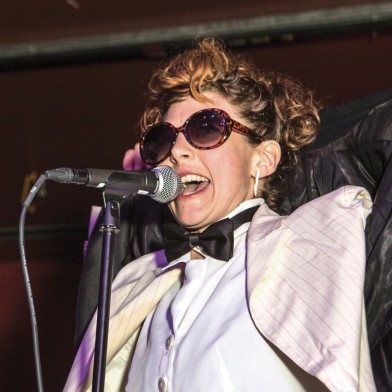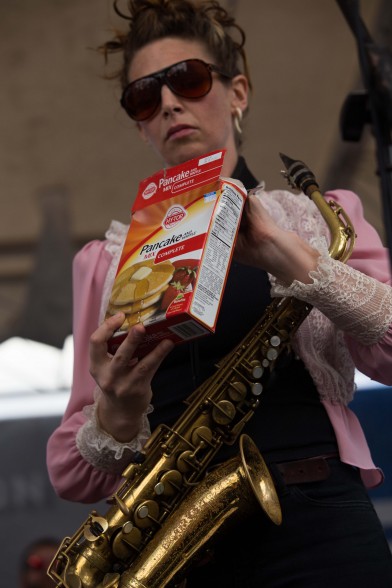You seemed to appear in New Orleans out of nowhere, yet you already had some devoted fans and played with some of the best in town. Can you tell us where you came from?
 In the beginning there was nothing. Then there was something. Then there was Man, and shortly thereafter followed free will and frozen waffles (in the ice age). Next there was Danger. And from Danger, the loins of El Duende, and the miracle of plate tectonics sprung forth the countryside of Dangeria, where coincidentally, a lot of us keep a summer home (just about a hundred miles downriver—when you come to the crossways, take a left and then three rights). It was there that I first learned to rock it like it’s hot. Hail Dangeria! The land that’s brave and blue.
In the beginning there was nothing. Then there was something. Then there was Man, and shortly thereafter followed free will and frozen waffles (in the ice age). Next there was Danger. And from Danger, the loins of El Duende, and the miracle of plate tectonics sprung forth the countryside of Dangeria, where coincidentally, a lot of us keep a summer home (just about a hundred miles downriver—when you come to the crossways, take a left and then three rights). It was there that I first learned to rock it like it’s hot. Hail Dangeria! The land that’s brave and blue.
The album is mostly good rock ’n’ roll, but there are also those pieces in between that have to do with a sea journey of some kind. How does that play into the Rory Danger story?
We are nothing if not our own hero’s journey, traversing the high seas of triumphs and failures, seeking out that great white whale of our own deepest ambitions, hopes and desires. The sage words of Allen Ginsberg (who, coincidentally, was our fifth guitarist for a short stint) sum up our story pretty aptly:
“The weight of the world is love. Under the burden of solitude, under the burden of dissatisfaction the weight, the weight we carry is love. Who can deny? In dreams it touches the body, in thought constructs a miracle, in imagination anguishes till born in human—looks out of the heart burning with purity—for the burden of life is love, but we carry the weight wearily, and so must rest in the arms of love at last, must rest in the arms of love. […} The warm bodies shine together in the darkness, the hand moves to the center of the flesh, the skin trembles in happiness and the soul comes joyful to the eye—yes, yes, that’s what I wanted, I always wanted, I always wanted, to return to the body where I was born.”
Seems like a lot of your inspiration comes from vintage rockabilly, but you also do interesting covers like Cher’s “Bang Bang.” Who looms large in your musical universe?
While certainly Cher, and her impressive hair, are a universal inspiration to us all, I would have to say that Ernest Shackleton is probably our biggest musical influence. Such a rocker, and can really make a damn good cup of tea.
I saw a show last year at Jazz Fest where you tried to play every song in 30 minutes and had them all cut off after 75 seconds. How did that idea come about, and is that the most fun thing you’ve done onstage?
In times of great constraint spring forth feats of the unimaginable. We were set to the task of playing a 20-minute show, which as any true rocker will tell you is just enough time for your bassist to tune his E string. In the sage words of Nelson Mandela (who, coincidentally, we once asked to be our sixth guitarist—he declined on account of being preoccupied with being one of the world’s most visionary leaders and humanitarians): “We must use time wisely and forever realize that the time is always ripe to do right.” No matter how short the time constraints, the right thing to do is always to deliver at least 14 good rockers to a crowd.
New Orleans is of course full of gifted jazz players, Aurora Nealand being one of them. What’s your opinion on that kind of music?
Ah, jazz! That great primordial soup of sound. We have often heard that New Orleans is known as the birthplace of jazz, and that moniker indeed seems to ring true—all across the city you can hear the laboring cries of fabulous musicians giving birth, breathing their Lamaze in a collective joyous rhythm and pushing out the beautiful mutant baby of improvisation and composition. In the wizened words of Lou Reed (who was our sub bongo-ist for a short stint), “One chord is fine. Two chords are pushing it. Three chords and you’re into jazz.” And as for the question about Aurora Nealand? Never heard of him.





